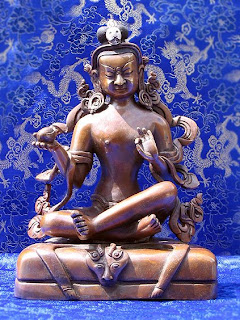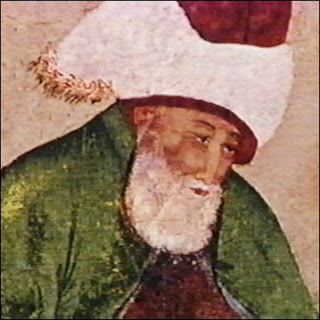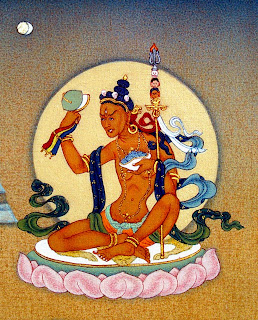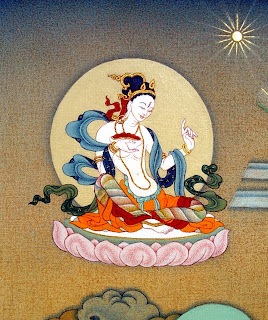Homage to the state of great bliss!
Concerning what is called Mahamudra
All things are your own mind.
Seeing objects as external is a mistaken concept;
Like a dream, they are empty of concreteness.
This mind, as well, is a mere movement of attention
That has no self-nature, being merely a gust of wind.
Empty of identity, like space.
All things, like space, are equal.
When speaking of 'Mahamudra'
It is not an entity that can be shown.
There the mind's suchness
Is itself the state of Mahamudra.
It is neither something to be corrected nor transformed,
But when anyone sees and realizes its nature
All that appears and exists is Mahamudra,
The great all-encompassing Dharmakaya.
Naturally and without contriving, allowed simply to be,
This unimagined Dharmakaya,
Letting it be without seeking is the meditation training.
But to meditate while seeking is deluded mind.
Just as with space and a magical display,
While neither cultivating nor not cultivating
How can you be separate and not separate!
This is a yogi's understanding.
All good deeds and harmful actions
Dissolve by simply knowing this nature.
The emotions are the great wisdom.
Like a jungle fire, they are the yogi's helpers.
How can there be staying or going?
What meditation is there by fleeing to a hermitage?
Without understanding this, all possible means
Never bring more than temporary liberation.
When understanding this nature, what is there to bind you?
While being undistracted from its continuity,
There is neither a composed nor an uncomposed state
To be cultivated or corrected with a remedy.
It is not made out of anything
Experience self-liberated is dharmadhatu.
Thinking self-liberated is great wisdom,
Non-dual equality is dharmakaya.
Like the continuous flow of a great river,
Whatever you do is meaningful,
This is the eternal awakened state,
The great bliss, leaving no place for samsara.
All things are empty of their own identities.
This concept fixed on emptiness has dissolved in itself.
Free of concept, holding nothing in mind,
Is in itself the path of the Buddhas.
For the most fortunate ones,
I have made these concise words of heartfelt advice.
Through this, may every single sentient being
Be established in Mahamudra.
This was given orally by the great pandita Naropa to Marpa at Pullahari.
(Translated by Erik Pema Kunsang.
Published in Songs of Naropa: Commentaries on Songs of Realization, by Thrangu Rinpoche (Rangjung Yeshe Publications, 1997).
Homage to the state of great bliss!
Concerning what is called Mahamudra
All things are your own mind.
Seeing objects as external is a mistaken concept;
Like a dream, they are empty of concreteness.
What is our life? What does it consist of?
Thoughts, feelings and sensations. That's it. All of what we think of as life, our relationships, our work, our practice, our hopes and fears, our body, our sense of self, our children, our car, our iPod, etc - it's thoughts - stories that pass through experience - it's feelings - it's what going on emotionally, and it's sensations - it's sensory sensations of hearing, seeing, tasting, smelling and touching ... that is our life. Life is experience. Life is mind. There isn't any world out there we can touch directly.
 Yet we constantly project the display of mind into solid stuff that is actually out there. When we look, when we know .... we see that life has no more substance than a dream. As each appearance is examined ... we see that it is empty of substance .. where is it, we cannot say. What is it, we cannot say. Where did it come from, we cannot say. It's mysterious. It's undefinable. It's like a mirage, like a dream, without substance.
Yet we constantly project the display of mind into solid stuff that is actually out there. When we look, when we know .... we see that life has no more substance than a dream. As each appearance is examined ... we see that it is empty of substance .. where is it, we cannot say. What is it, we cannot say. Where did it come from, we cannot say. It's mysterious. It's undefinable. It's like a mirage, like a dream, without substance.It's all mind. It's all experience.
This is the nature of the Mahamudra of perception.
This mind, as well, is a mere movement of attention
That has no self-nature, being merely a gust of wind.
Empty of identity, like space.
All things, like space, are equal.
When we turn attention to what is aware of all this experience ... what knows experience? What do we find? Nothing.
Though we have this sense that 'something' is aware of all these appearances which seem to arise and fall .... when we ask "what is aware?" .. and rest in the gap that follows this .... we do not see anything .. our knowing reveals .. nothing. Nothing - no-thing.
This is the nature of the Mahamudra of awareness.
When speaking of 'Mahamudra'
It is not an entity that can be shown.
There the mind's suchness
Is itself the state of Mahamudra.
When we rest in knowing, it's clear that there seems to be arisings, yet nothing can be found. These are both equally there, and yet not there. Nothing, and seemingly something. At one and the same time, we can know the inseparability of appearance and emptiness ... luminous emptiness.
There's nothing we can really say ... it's just like this ... empty, and yet at once apparent... suchness.
This is the nature of the Mahamudra of union.
These three were the view - the view of Mahamudra.
It is neither something to be corrected nor transformed,
But when anyone sees and realizes its nature
All that appears and exists is Mahamudra,
The great all-encompassing Dharmakaya.
Unlike in so many approaches to mediation, to practice, or to the spiritual path, mahamudra emphasises one of self-liberation .. where nothing needs to be done. We don't need to correct what we find. We don't need to strive after some special state. We don't need to be good, to be better, to be enlightened.
Just being aware, just resting in attention, with whatever is present, right now, just as it is. This resting in what is present, resting in knowing what is present, resting in knowing the nature of what is present right here and know. This takes care of the whole thing :-)
Do nothing, rest in awareness.
How things are is Dharmakaya. How things are is emptiness. How things are is unfindable, ungraspable, groundless, nameless, unborn ... this doesn't change with practice. It is simply how experience is. How mind is. Now, when you are awakened, when you are unawakened. It is the ground.
There is no experience that isn't this way. Nothing in samsara or nirvana.
This is the nature of the Mahamudra of the basic state.
Naturally and without contriving, allowed simply to be,
This unimagined Dharmakaya,
Letting it be without seeking is the meditation training.
But to meditate while seeking is deluded mind.
The path of Mahamudra consists of letting it be. Of letting go. Of simply being aware of what is, right now. In its nature. And resting there.
No effort. No effort to being aware, no effort to doing anything with what we are aware of. No correcting. No fabricating. No seeking to get away from, to have any other experience. No trying to attain, or to develop, or change.
Seeking takes you away from what is, here, right now. Only with what is, right here, can the nature of mind, of experience be known.
We don't need to conjure up this emptiness, this Dharmakaya. We don't need to be still, to have no thoughts or emotions, or only perfect ones. We just allow what is present to be .. to rest in awareness, rest in knowing ... and know.
This is the nature of the Mahamudra of realization.
Just as with space and a magical display,
While neither cultivating nor not cultivating
How can you be separate and not separate!
This is a yogi's understanding.
Am I separate from this display, these appearances, this awareness, this experience, this mind?
I'm not looking literally *at* experience. As if there is an 'I' over here, and 'experience' over there. I simply rest in knowing. If a sense of 'me' arises, it arises as an experience. One more experience. Subjectivity arises as an experience. If a sense of something 'out there' arises, it arises as an experience. One more experience. Sometimes there's this flicker of 'I-ness' which seems to be there .... knowing cannot find it. Only when we project a world out there, only when we project a me in here, only with this imaginary life of things, of inner me, of division ... only then is there a seeming separation. But with awareness, with knowing of thoughts, feelings and sensations .. no sense of separation is ever found. There's no me, you, things, inner, outer .... it's just ... mind, experience, call it what you will.
Just a magical display which appears in emptiness ... empty yet seemingly appearing at one and the same time. No separation can be found between this seeming dream, nor the nothingness of the dream.
This is the nature of the Mahamudra of indivisibility.
These three are meditation - the Mahamudra of meditation.
Clarifying the view and clarifying mediation, Naropa now clarifies conduct.
All good deeds and harmful actions
Dissolve by simply knowing this nature.
The emotions are the great wisdom.
Like a jungle fire, they are the yogi's helpers.
We don't need to change who we are, strive to be good, to be a better person, to be enlightened. Our nature is what it is, empty, unborn, regardless of whether clouds appear to obscure the sun or not. Action is what it is ... seeming appearances arising. Past action ... past deeds, karma ... dissolves like snow on hot stones in the knowing of knowing. In emptiness, in knowing emptiness, nothing disturbs us, however 'violent' the emotions, however 'difficult' the stuff that arises. It simply is what it is, it seems to arise, and in knowing, in resting in knowing, it seems to pass though and pass away. Yet what arose, what went? And where? Like a dream, these actions.
True enough, the stronger the emotion, the more energy is available for attention, *if* we can rest in it. Can we just rest in it, this raging sea? If we can, then awareness gains in energy, and knowing penetrates ever deeper. If we can't, we are blown off course, and start reacting to the emotion, to pushing and pulling.
Just know what is .... this mass of knotted emotion ... don't push it away, don't try to transform it, don't try to get past it, or through it, or even try to understand it. Just rest in the knowing .... and emotion will fuel the knowing like a raging fire.
If we have sufficient capacity to rest in awareness, then the more emotion, the greater the awareness, the greater the knowing .. it's all good :-)
This is the nature of the Mahamudra of self-liberation.
How can there be staying or going?
What meditation is there by fleeing to a hermitage?
Without understanding this, all possible means
Never bring more than temporary liberation.
You don't need to be in 'ideal conditions' to meditate or practice. You don't have to have a certain lifestyle. You don't have to be a monk or nun, single, on retreat, or any particular place in life to practice mahamudra.
You just need to be right were you are .... now .... right here .... and rest in the knowing of what is present. That's it. And ever time you realise you are not right there, then you open awareness out, and rest in it. And know mind, know experience right here, right now.
Otherwise you build dependency and attachment. Attachment to conditions, attachment to a way of life, attachment to being Buddhist.
Attachment brings suffering in its wake, not liberation.
You don't need to go anywhere to experience liberation. All dharmas self-liberate. Right here and now, just as it is, rest in knowing, in wakefulness, and know things as they are.
Bringing all of life to the path, all of life to practice ... wherever you are, whatever is there, resting in the knowing ...
Then you'll see that all experiences have the same taste .... the taste of emptiness, the taste of seeming appearances, the taste of inseparable appearance and emptiness. You don't have to go anywhere to know this. All experience is like this ... all possible experience is like this.
This is the nature of the Mahamudra of equal taste.
When understanding this nature, what is there to bind you?
While being undistracted from its continuity,
There is neither a composed nor an uncomposed state
To be cultivated or corrected with a remedy.
When I rest in this knowing, it's as if all the dreams of suffering are a mirage .. how could they possibly arise, how could I ever get lost in all this, imagining it's all real, in here and out there?
Nothing binds in this knowing, life flows, with great ease, actions take place spontaneously, we simply know what to do, and do it, at any moment, in any circumstance.
There is just this flow of ease ... and we simply do what needs to be done.
This is the nature of the Mahamudra of indivisibility.
And these three were conduct - the Mahamudra of conduct.
Goodness me ... what a lot of words!
Just rest in the knowing of what is here already.
:-)
















